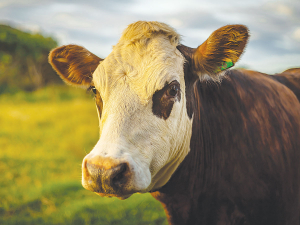Fonterra’s exit from Australia ‘a major event’
Fonterra’s impending exit from the Australian dairy industry is a major event but the story doesn’t change too much for farmers.
 NZ beef production in 2024 is expected to fall around 3% because of ongoing contraction in dairy and beef herds.
NZ beef production in 2024 is expected to fall around 3% because of ongoing contraction in dairy and beef herds.
There's a glimmer of hope that NZ red meat producers will have a better year in 2024, despite Rabobank's most recent annual Global Animal Protein Production Outlook report predicting a slowdown or decline across some protein types this year.
Rabobank global strategist animal protein Justin Sherrard says NZ beef production for 2024 is expected to fall around 3% because of ongoing contraction in dairy and beef herds.
"[However] the contraction in the US beef production system should support beef export prices and, in turn, cattle prices," he explains. "While increased Australian volumes will keep prices competitive. We believe a lift in US import demand should see New Zealand cattle prices trade slightly above the five-year average through 2024."
Meanwhile, improving ewe numbers and breeding conditions are expected to lead to higher lamb numbers and an increase in sheepmeat production and exportable lamb volumes in 2024.
While 2023 had seen softer than expected global demand combined with higher Australian volumes, Sherrard believes there will be a gradual improvement in global markets in 2024 with slightly stronger prices, although ongoing large volumes from Australia will still limit upside.
"With forecast beef and lamb production close to the five-year average, New Zealand producers will be looking for an increase in global demand to support livestock prices."
The report says ongoing pressure - particularly environmental - on New Zealand's livestock industries will continue in 2024 and prevent any major production growth.
It also says producers and processors will need to adapt to sustain success amid tight margins. With higher production costs, adverse weather and tighter supplies is expected to push animal protein prices up.
However, a constraint in global consumption may lead to pressure on processors to invest in upgrading production systems to serve emerging market needs, meet regulatory requirements and cater to changing consumer preferences around sustainability.
The report also points to demographic shifts that will see the labour market tighten and raise production costs, while reduced population growth will slow consumption. Production in the major markets is forecast to grow 600,000 tons to a total of 247 million tons next year, compared to a 2.1M ton growth in 2023.
Sherrard says it was a testament to the resilience and flexibility of companies along animal protein supply chains that they continue to grow production and deliver on customers' demands amid such challenging market conditions.
Dairy Women's Network (DWN) has announced that Taranaki dairy farmer Nicola Bryant will join its Trust Board as an Associate Trustee.
Rural Women New Zealand (RWNZ) says it welcomes the release of a new report into pay equity.
Red meat exports to key quota markets enjoyed $1.4 billion in tariff savings in the 2024-25 financial year.
Remediation NZ (RNZ) has been fined more than $71,000 for discharging offensive odours described by neighbours as smelling like ‘faecal and pig effluent’ from its compositing site near Uruti in North Taranaki.
Two kiwifruit orchards in the Bay of Plenty and one in Northland are this year's finalists for the Ahuwhenua Trophy competition.
The Government's chief science advisor, Dr John Roche says the key objective for the science sector in the coming year is bedding down the reforms which sees the merger of the previous entities.

OPINION: A mate of yours truly reckons rural Manawatu families are the latest to suffer under what he calls the…
OPINION: If old Winston Peters thinks building trade relations with new nations, such as India, isn't a necessary investment in…